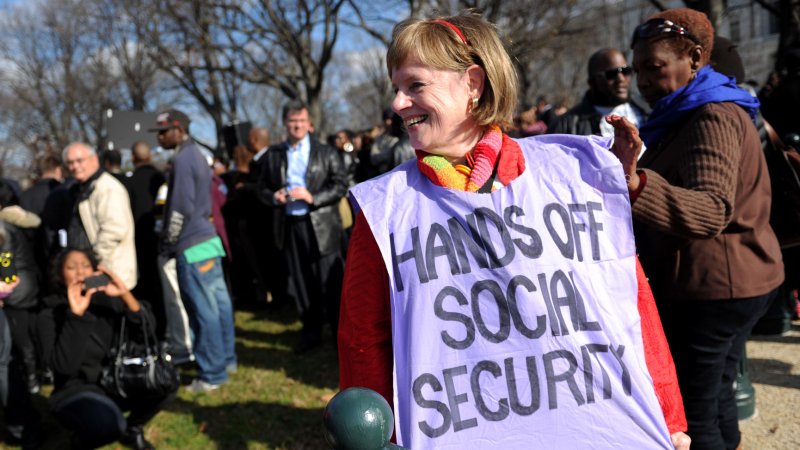One thing we can say for sure about reforms to Social Security and Medicare: Future programs won't look like grandma's plans.
As we prepare for the 2013 annual trustees reports for both programs designed to keep the elderly from destitution, it's a sure bet they won't be any more optimistic than last year's, in part because there was a 2 percent cut in payroll withholding that was a tepid attempt to boost the economy.
Republicans for years have been trying to figure out a way to pare entitlement programs, which are gobbling up ever bigger chunks of the federal budget. During the Bush administration, Republicans pushed privatizing Social Security, allowing younger workers to opt for private investments rather than the government program.
Talk of such a revision faded with the recession.
More recently, Republicans have been recommending Medicare be turned into a voucher system that would provide seniors with a stipend and let them find their own coverage.
All the while, the proposals have been coupled with assurances those approaching retirement age -- those 55 and older now -- would not be affected.
There's not much that can be done about the demographics. Baby boomers began hitting retirement age last year at a rate of 10,000 a day. Just as boomers strained school systems when they were children, so now will they strain the programs that have given seniors peace of mind as they advanced in years.
Currently, Social Security and Medicare gobble up more than a third of the federal budget, the Heritage Foundation reported. Dollar outlays for Social Security are up 35 percent since 2002, from $577,713 in 2002 to $781,172 last year, averaging $1,229 per month to each of the 35.6 million retired workers; for Medicare, they're up 70.3 percent, from $293,188 to $499,284. Social Security benefits also are paid to 2.9 million spouses and children of retired workers, 6.3 million surviving children and spouses of deceased workers, and 10.6 million disabled workers and their eligible dependents. Medicare covers some 48 million retirees and disabled, the Center on Budget and Policy Priorities reported.
The Business Roundtable noted the last trustees report warned the Social Security Trust Fund would be exhausted by 2033; Medicare by 2024.
The roundtable, an association of chief executive officers representing companies with more than $7.3 trillion in annual revenues and 16 million employees, recommends increasing the retirement age and Medicare eligibility to 70 and making benefit formulas progressive -- the wealthy would see their benefits reduced.
The roundtable also says people should save more on their own so they're not so dependent on Social Security, and state and local workers should be brought into the system.
For Medicare, the roundtable says, the answer is more competition.
The recommendations, however, conveniently ignore the reasons Social Security and Medicare were set up in the first place: Lower income workers don't have the wherewithal to set aside enough for retirement on their own as daily expenses keep rising and private coverage for the elderly, largely because of the infirmities that come with age, is just too costly. They also make no mention of proposals to lift the cap on contributions, which currently end once a salary hits $110,100 for the year.
White House spokesman Jay Carney told reporters last week President Obama believes Social Security and Medicare "have been enormously valuable to seniors in our country, and [provide] the security that has allowed for stronger economic growth, and stronger job creation, and a stronger middle class. ...
"The facts and figures on what the plight of the nation's seniors was prior to Social Security are well known. The insecurity that seniors face or would face if Medicare were voucherized and the cost were shifted to them, if they had a limited amount of money to spend on healthcare and the rest was up to them, I think would not be good for the country. The president doesn't believe it's good for the country."
Carney said the administration recognizes changes need to be made to the programs to strengthen them for the future.
"What we don't need to do is eliminate them as we know them, or slash benefits simply to protect the benefits of wealthy individuals or corporations," Carney said. "That's not a -- a choice the president believes we have to make."
The problem, of course, comes back to the deficit and how it is going to be tamed. Carney said Obama will not allow deficit reduction to be carried solely on the backs of seniors and the middle class.
To Republican ears, that sounds like another call for increased taxes on the wealthy and businesses -- something they've already rejected as a solution.
FactCheck.org notes the federal income tax accounted for 41.5 percent of all federal revenues in 2010, down from 49.6 percent before the Bush tax cuts. At the same time, the United States borrowed 36 cents for every $1 spent in 2011, down from 40 cents in 2009.
"Historically high rates of spending and low rates of taxation have combined to produce a chain of deficits that are also the highest since [World War II]," FactCheck.org said.
So, saddle up. The battle lines have been drawn as Congress wrestles with the sequester and deficit reduction in the next few weeks. Obama laid out an agenda in his inaugural address; Republicans see it as a call to arms that threatens the largely hollow mantra of smaller government.















